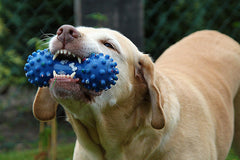
House training a dog is essential for proper hygiene. When you house train your furry friend, you teach them to relieve themselves outside of the home, rather than inside. Without house training a dog, you'll likely wind up finding plenty of messes that your dog makes while you go out to work or are asleep in bed.
As you might expect, house training a dog is not trivial. Here are five excellent puppy potty training tips that will get your pup or adult dog house trained in as short a time as possible!
House Training a Dog: Establish a Routine

The best way to house train a dog is to ensure that you keep a consistent routine. Dogs are sensitive to times, and when you create that rhythm of predictable times, you also condition them to want to relieve themselves at regular intervals.
Puppies can go approximately one hour per month of life, up to eight hours maximum, holding their urine. Therefore a two-month-old puppy will need to do their business outside once every two hours. However, your dog can avoid using the restroom overnight once he or she gets older.
Given this, establish a routine that works well for your dog's situation and age. For example, if you have a three-month puppy, make sure that you go out for a walk every 2-3 hours to let them do their business properly. If you wait longer than that, an accident will almost surely happen.
So, depending on your dog's age, pick some appropriate interval, go outside regularly, and go to a particular bathroom spot. That type of routine will help them establish a regular waste elimination cycle.
Reward Your Dog for Going Potty Outside

When your dog does go outside, reward him or her with some good dog training treats! Think of using the restroom as training. Every time your dog does the trick correctly, you reward them for starting. These rewards encourage your dog's behavior.
Think of going potty outside as a "trick" that they're performing. Reward your dog to encourage your beloved pet to do that more - i.e., release any waste outside instead of inside the house.
When combined with a regular schedule, you can reinforce this behavior regularly, which should make house training your dog much easier for you! Remember, your dog is smart so as long as you're committed and consistent, they will learn everything in no time!
Plan for Mistakes

Mistakes will happen. Your dog is learning, and, as such, you will probably find a few times when there's a surprise on the floor.
If your dog has already eliminated their waste inside the house, there's nothing you can do but clean it up. Some people have erroneously suggested rubbing your dog's nose in it or yelling, but these actions are more harmful than helpful. However, dogs tend to eliminate in areas that smell similar to canine waste, so if you leave it, your dog will likely go back there. As such, thoroughly clean it ASAP. Have some strong cleaners on hand in case this does happen.
If you catch your dog in the act, make a startling noise, and quickly direct them to the place where they should go. If they go there, give them a treat and some praise. You want to reinforce that good behavior!
Cover anything that your dog might soil inside that is super valuable. It would be best if you planned for your pup to make some mistakes. Hide anything that absolutely under-no-circumstances can have an accident to avoid anything worthwhile receiving damage.
Ensure Your Dog Sitter, If You Have One, Is on the Same Page

If you're going to be away for any length of time, you may need to hire a dog sitter. Ensure that they are on the same page when it comes to your routines to avoid any confusion.
If you don't have a sitter, you can train your dog to eliminate in a "safe place" indoors (e.g., like a litter box). This method is far less preferable as it can be hard to get your pet to understand which place to use - the indoors one or the outdoors one!
Regularly Feed Your Dog

Ensure that your feeding schedules are very routine. That should lead to more consistency when they need to use the bathroom. Suppose, for example, that your dog needs to go approximately two hours after eating a meal. If you feed your dog at 9 am, you know you'll have to go for a walk around 11 am. However, if you provide your dog food at 9 am one day, 11 am the next, and so forth, you'll never be too sure of when your pet will need to use the bathroom! Aside from regular and consistent feeding time, you should also know how much to feed your dog based on their size, age, and breed.
Create a consistent, routine feeding schedule, so you know, roughly, each day when you need to take your dog out for a walk!
House Training a Dog: Challenging But Not Impossible

You can house train your dog with relative ease. It does require some patience, especially when you're house training an older dog without a crate, but it is very much worth it. Once you have your dog trained, you can have confidence that your pup will go outside the home instead of the inside.
Have patience and treat it like teaching any other trick. Your dog will be potty trained before you know it!
If you have a cat instead of a dog, check out our house training guide for cats here!
How long does it take to house train a dog?
Is it hard to house train a dog?
What is a house-trained dog?
Check out our blog and follow me on LinkedIn to stay up-to-date!




